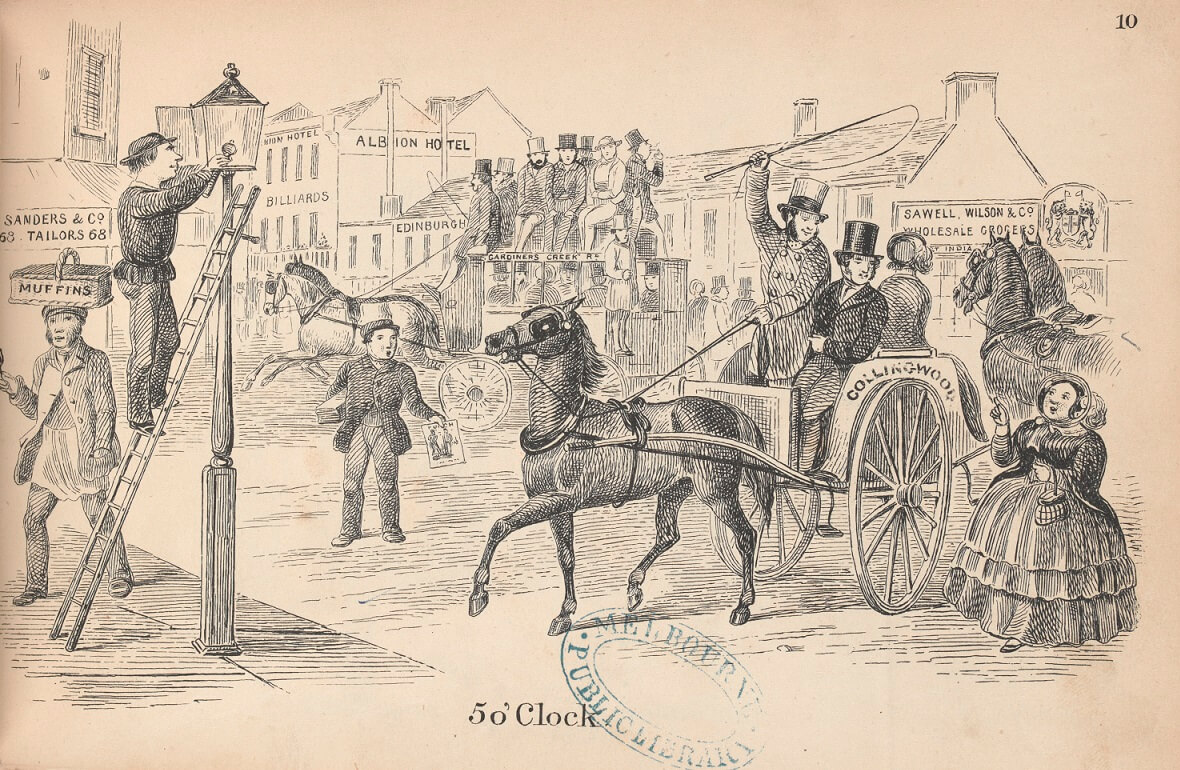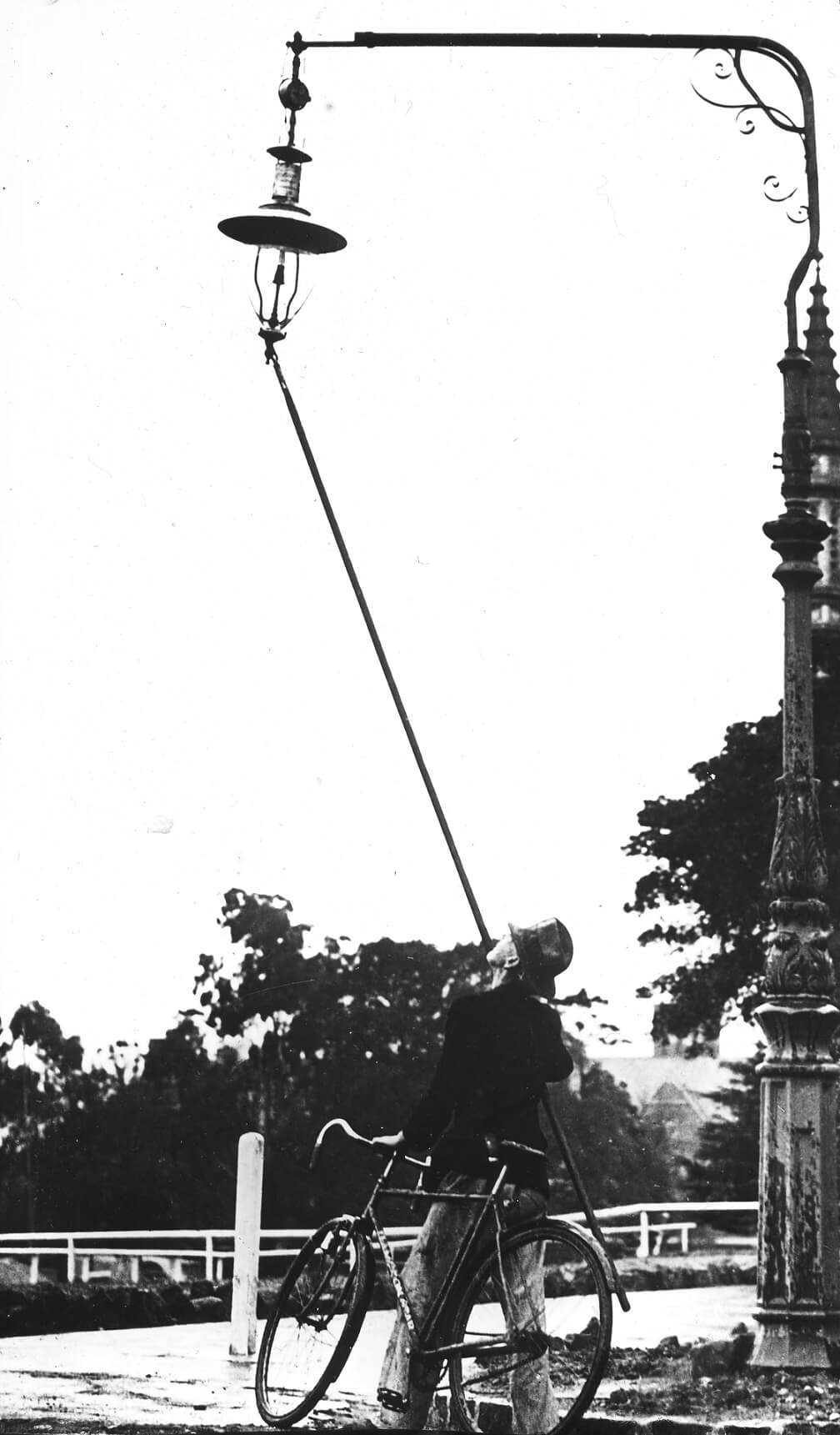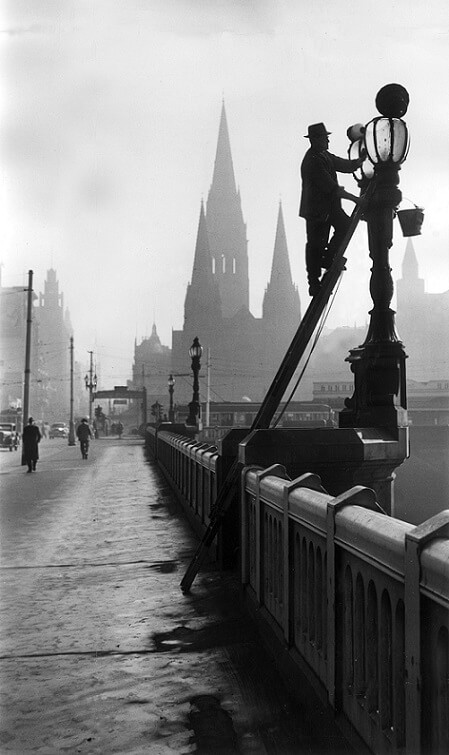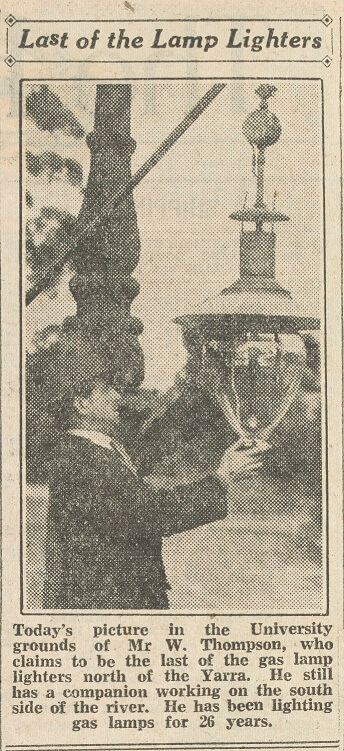My tea is nearly ready and the sun has left the sky;
It’s time to take the window to see Leerie going by;
For every night at teatime and before you take your seat,
With lantern and with ladder he comes posting up the street.
Now Tom would be a driver and Maria go to sea,
And my papa’s a banker and as rich as he can be;
But I, when I am stronger and can choose what I’m to do,
Oh Leerie, I’ll go round at night and light the lamps with you!
For we are very lucky, with a lamp before the door,
And Leerie stops to light it as he lights so many more;
And O! before you hurry by with ladder and with light,
O Leerie, see a little child and nod to him tonight!
Robert Louis Stevenson, ‘The Lamplighter’, 1885
Gas lamps provided the only street lighting in early Melbourne. The first gas lamps were lit in 1857, and by 1860, there were 414 lamp pillars in the city alone. Teams of lamplighters lit the gas lamps ‘thirty minutes after sunset’ and kept them alight until dawn. They used a long pole, and a kerosene rag, to ignite the lamps.
A lamplighter in ‘5 o'Clock’, by Henry Heath Glover, artist, 1857
Reproduced courtesy State Library Victoria
‘Sundays bringing no respite for them’ – The Herald, 2 August 1913
Lamplighting employed many men with most lamplighters working a seven-day week, with 50 to 80 lamps. They travelled about ten miles per day, on foot or bike. They lit the lamps each night before dusk, and at dawn would return to extinguish them. They were also expected to clean the lamps and replace the lantern glass if broken. According to one lamplighter:
Lighting takes from two to two and a half hours, according to the climatic conditions and the state of the lamps, although the time is considerably shortened by those who use bicycles, which they provide at their own expense…
To last at lamplighting, a man must be a good walker and a good climber… In windy weather, when a kerosene rag is useless, the man has to climb telegraph poles to light the bracket lamps should the pilots be out.
Lamplighter in Brunswick, by unknown photographer, c.1920
Reproduced courtesy Moreland City Libraries
‘Dreary round. Poor pay and worse work.’ – The Herald, 2 August 1913
Wages were poor and it was hard to make a living. Alfred C.J. Marshall worked for the Metropolitan Gas Company at South Melbourne in 1913 and was paid only 25 shillings per week - ‘not enough to keep his wife and three children’. Most men held second jobs during the day. The Herald reported:
The majority of lamplighters are married men with families, and as the renumeration they receive is insufficient for their support, they have to find other means to augment their slender incomes. Consequently on their spare days they are marine dealers, gardeners, boot repairers, laborers [sic], or handy men. The lamplighter is no sluggard. He goes to bed late, and is up at seven to do – or, what is worse, to look for – some other work. Winter is the worst time, not only on account of the elements, but also because of the scarcity of casual work, and the early lighting time – 4 or 4:15 p.m. – which prevents him getting a full day in. In summer he does not start till 6 or 6:30 p.m.
The job had other unattractive attributes. One was the moths and spiders, which ‘infested the lamps and broke the mantles’ – another, the ‘small boy, to whom the lamp-post appeals merely as an Aunt Sally or a good gymnastic appliance.’ Accidents were common. In 1904, Aaron Robinson, a lamplighter in Port Melbourne, was replacing a broken lamp when he overbalanced and fell. He sustained a fractured collarbone and severe head wound. Oliver Dean lost his life in Windsor in 1923 while cleaning a lamp. The bracket of the lamppost snapped, and he fell a distance of 12 feet. He had worked for 20 years as a lamplighter for the Metropolitan Gas Company.
It was not an easy job. One discontented lamplighter wrote to The Herald newspaper in 1913:
Fancy tramping round wet and dirty streets in the small hours of the morning… All the dogs of the town howl, the lamplighter down, and the cats yell at him like lost souls, the while he trudges through mud and slush with a world of gloom on his shoulders and no one near to help him bear it up…
Sometimes in winter he will get wet through on both trips for a whole week. All this necessitates good boots, good clothes, and a good heart. Of course, in summer the conditions are somewhat better; but summer-time means more insects and more broken glass, consequently more time wasted.
Out of a job
In 1883 experimental electric lighting was installed in the Public Library and in 1888 the Melbourne City Council replaced two gas lamps at a city intersection with electricity. From the 1890s street lighting gradually replaced gas and lamplighters were redundant. The Metropolitan Gas Company employed 132 lamplighters in 1912. By 1933, there was only one left.





